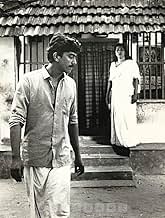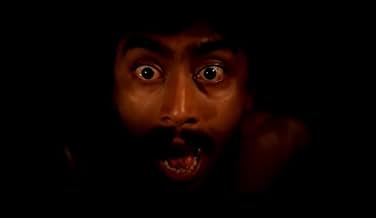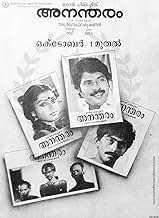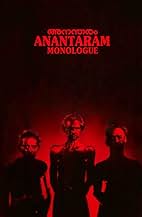Agrega una trama en tu idiomaA young man narrates two conflicting accounts of his life, changing the details and incidents in both, as he slowly approaches madness.A young man narrates two conflicting accounts of his life, changing the details and incidents in both, as he slowly approaches madness.A young man narrates two conflicting accounts of his life, changing the details and incidents in both, as he slowly approaches madness.
- Dirección
- Guionista
- Elenco
- Premios
- 2 premios ganados en total
- Dirección
- Guionista
- Todo el elenco y el equipo
- Producción, taquilla y más en IMDbPro
Opiniones destacadas
Set in the busy state of Kerala, India, Anantaram is a Malayalam film about a lifetime event that happens to a man named Ajayan. Released in 1987, this film is a prime example of Gopalakrishnan's unique directing style, characterised by diligent production and meaningful storytelling. The film starts when Ajayan is a baby and continues into adulthood. For the first 30 minutes of this film, I can tell that the main character, Ajayan, is a troublemaker with a piece of advanced knowledge and mind. This can be seen in one scene where he is late to school and scolded by his teacher. In that scene, he is the character who goes against the norm and breaks the stereotype. He rejects conventional social conventions and explores the limitations imposed on individuals based on their caste, class, and tradition. Ajayan's figure symbolises a spirit of liberation and resistance against repressive systems through his aspirations and societal norms. In addition, this can only be accomplished with the fantastic performance by Ashokan in the leading role. His performances are subtle yet compelling, enabling the audience to deeply understand and relate to the characters' predicaments. Next, I would like to highlight the mesmerising cinematography in this film. The visual storytelling in Anantaram is exceptionally remarkable. Gopalakrishnan utilises extended shots and nuanced visual elements to communicate the internal conflicts experienced by his characters effectively. Mankada Ravi Varma's cinematography effectively portrays the beautiful countryside of Kerala, adding an appealing setting to the characters' inner conflicts. Other than that, I cannot help but notice that the storyline never really tallies, and to connect it to my conclusion, by the end of the movie, where he was reminded to take his medicine, I assumed that Ajayan suffers from some sort of mental illness like schizophrenia or short term memory loss.
The writing adopts a structure that effectively portrays the tumultuous and unreliable psyche of a person grappling with schizophrenia, exploring complicated themes like subjective reality and sexual repression.
Suffice to say, The vision was remarkably ahead of its time and its peers, which undoubtedly contributed to the Malayalam film industry receiving numerous prestigious accolades and much deserved recognition.
However, the execution and overall presentation here may at times appear somewhat banal, particularly when juxtaposed with contemporary features that explore similar themes with greater intent and freedom. I also feel, It would have been beneficial for the narrative to focus more on ambiguity and emotional resonance rather than primarily questioning the fragility of "truth" and the "memories" we revisit later in life.
Nonetheless, we must acknowledge the filmmakers' bravery and resolve in tackling a niche idea with one of industry's emerging talents at the time, Mammootty, especially considering that the cultural appreciation for cinema in its purest form was still in its nascent stages.
Suffice to say, The vision was remarkably ahead of its time and its peers, which undoubtedly contributed to the Malayalam film industry receiving numerous prestigious accolades and much deserved recognition.
However, the execution and overall presentation here may at times appear somewhat banal, particularly when juxtaposed with contemporary features that explore similar themes with greater intent and freedom. I also feel, It would have been beneficial for the narrative to focus more on ambiguity and emotional resonance rather than primarily questioning the fragility of "truth" and the "memories" we revisit later in life.
Nonetheless, we must acknowledge the filmmakers' bravery and resolve in tackling a niche idea with one of industry's emerging talents at the time, Mammootty, especially considering that the cultural appreciation for cinema in its purest form was still in its nascent stages.
Monologue (1987)
How can I even attempt to describe what I've just witnessed unravel on screen? What can I say about the greatest Indian film ever made?
I tracked down and had a chat with film director Adoor Gopalakrishnan last month because I was fascinated by the logline to Anantaram (or Monologue, a film I hadn't seen till then), which describes the story to this picture as such:
"Ajayan gets sexually attracted to his brother's wife and this creates trouble for him. However, his life changes for the better when another girl enters his life."
My biggest regret now is that I didn't meet with the famed filmmaker after having been witness to his magnum opus, because I have so much to say to him, both in the form of praise and query.
Anantaram has no DVD copies in circulation, but it isn't a lost film. Adoor handed me a digital copy of the picture that is marvelously restored, which is important because this might be the single most chaotic experience I've had with a film.
I'm at a loss for words. Anantaram takes the storytelling device presented in that one scene in Persona which is repeated twice, and stretches it out to the entirety of its runtime. It deals with the life of Ajayan, a gifted intellect who has a hard time socializing, though he's something of a prodigy when it comes to education and sports. Wait.
It deals with the life of Ajayan, an orphan who hears stories of "medicines for adults", yakshis, and a man who can turn into a chicken, and he isn't very keen on educating himself, though his adopted father and foster brother are keen on helping him with his studies. Wait.
It deals with the life of Ajayan, a man who meets a strange woman come out of a bus and into his life, who makes him question the beauty and authenticity of the female existence. Wait.
It deals with the life of Ajayan, who gets sexually attracted to his brother's wife, this creating trouble for him. However, his life changes for the better when another girl enters his life. Wait.
It deals with the life of Ajayan. 1, 2, 3, 4, 6, 8, 10, 12, 14, 22, 34, 36...
It does not deal with the life of Ajayan. It deals with Ajayan, the person.
You know that feeling you get after you're done with a film, and you're so stunned by what you've just experience that your head and other parts of your body go numb, while you feel this adrenaline rush happen within you. It's not excitement. It's this fear.
Anantaram left me scared out of my wits, in fear of the hidden reality masked by the stories I'd heard thus far. Slowly attempting to make sense of it all, the film became less of a puzzle and more of a... I don't know what it is. I really don't.
It's not very confusing, don't get me wrong. The film gives you a puzzle, but it doesn't do so with the artificiality of great movies like Memento, Pulp Fiction, etc. You do not know it is a puzzle until the very end. Why do these people behave this way? Why is he doing that?
Anantaram is not only the greatest Indian film of all time, it is a masterpiece of world cinema. Adoor Gopalakrishnan, I bow down to your genius, and in fear of what your mind can come up with.
10/10
(I almost demand you to check it out. It isn't pretentious by an inch, if haters of pictures like Persona got that vibe from my review. I haven't made sense of it all yet. All I know is that I must see it again. As soon as possible.)
How can I even attempt to describe what I've just witnessed unravel on screen? What can I say about the greatest Indian film ever made?
I tracked down and had a chat with film director Adoor Gopalakrishnan last month because I was fascinated by the logline to Anantaram (or Monologue, a film I hadn't seen till then), which describes the story to this picture as such:
"Ajayan gets sexually attracted to his brother's wife and this creates trouble for him. However, his life changes for the better when another girl enters his life."
My biggest regret now is that I didn't meet with the famed filmmaker after having been witness to his magnum opus, because I have so much to say to him, both in the form of praise and query.
Anantaram has no DVD copies in circulation, but it isn't a lost film. Adoor handed me a digital copy of the picture that is marvelously restored, which is important because this might be the single most chaotic experience I've had with a film.
I'm at a loss for words. Anantaram takes the storytelling device presented in that one scene in Persona which is repeated twice, and stretches it out to the entirety of its runtime. It deals with the life of Ajayan, a gifted intellect who has a hard time socializing, though he's something of a prodigy when it comes to education and sports. Wait.
It deals with the life of Ajayan, an orphan who hears stories of "medicines for adults", yakshis, and a man who can turn into a chicken, and he isn't very keen on educating himself, though his adopted father and foster brother are keen on helping him with his studies. Wait.
It deals with the life of Ajayan, a man who meets a strange woman come out of a bus and into his life, who makes him question the beauty and authenticity of the female existence. Wait.
It deals with the life of Ajayan, who gets sexually attracted to his brother's wife, this creating trouble for him. However, his life changes for the better when another girl enters his life. Wait.
It deals with the life of Ajayan. 1, 2, 3, 4, 6, 8, 10, 12, 14, 22, 34, 36...
It does not deal with the life of Ajayan. It deals with Ajayan, the person.
You know that feeling you get after you're done with a film, and you're so stunned by what you've just experience that your head and other parts of your body go numb, while you feel this adrenaline rush happen within you. It's not excitement. It's this fear.
Anantaram left me scared out of my wits, in fear of the hidden reality masked by the stories I'd heard thus far. Slowly attempting to make sense of it all, the film became less of a puzzle and more of a... I don't know what it is. I really don't.
It's not very confusing, don't get me wrong. The film gives you a puzzle, but it doesn't do so with the artificiality of great movies like Memento, Pulp Fiction, etc. You do not know it is a puzzle until the very end. Why do these people behave this way? Why is he doing that?
Anantaram is not only the greatest Indian film of all time, it is a masterpiece of world cinema. Adoor Gopalakrishnan, I bow down to your genius, and in fear of what your mind can come up with.
10/10
(I almost demand you to check it out. It isn't pretentious by an inch, if haters of pictures like Persona got that vibe from my review. I haven't made sense of it all yet. All I know is that I must see it again. As soon as possible.)
Acting, making and colour grading.. exceptional.. The desperation of the protagonist is portrayed amazingly.. Shobhana..The GOT.. Her beauty is stunning in this particular movie.. The younger ajayan, played by sudeesh.. Mind blowing.. Direction as well is great..
"Monologue" is a film about perceptions or specifically the duality of perceptions.From Adoor's own words Ajayan is both introvert and extrovert at the same time. Duality plays a key role in the film, as a media film itself is dual in nature. We know what we see is fiction, but it's by convincing the viewers into believing in the film it succeeds. The film shows us two stories, both narrated by Ajayan like a monologue. After the first story, there seems to be something missing and the second is told like telling the odd number of events first and then the even number of events. But there still seem to be some parts which happened outside the frame. The Malayalam title "Anantaram" (translation: Thereafter) suggests either about the events being consequences or about the after effects. Full review at http://www.asianfilmvault.com/2017/09/monologue-1987-by- adoor-gopalakrishnan.html
Selecciones populares
Inicia sesión para calificar y agrega a la lista de videos para obtener recomendaciones personalizadas
- How long is Anantaram?Con tecnología de Alexa
Detalles
- Fecha de lanzamiento
- País de origen
- Idioma
- También se conoce como
- Thereafter
- Productora
- Ver más créditos de la compañía en IMDbPro
- Tiempo de ejecución
- 2h 5min(125 min)
- Color
Contribuir a esta página
Sugiere una edición o agrega el contenido que falta















